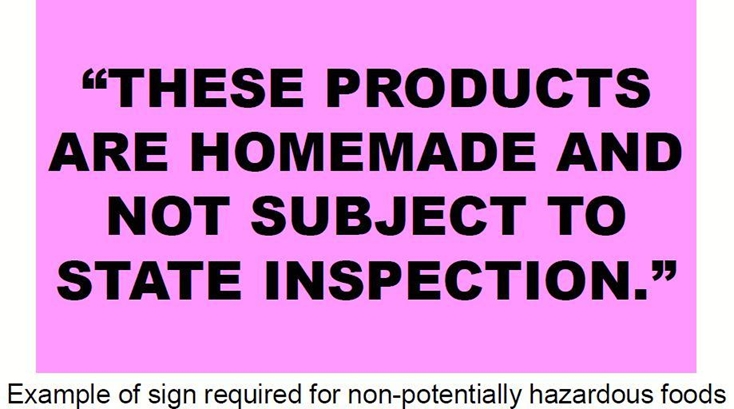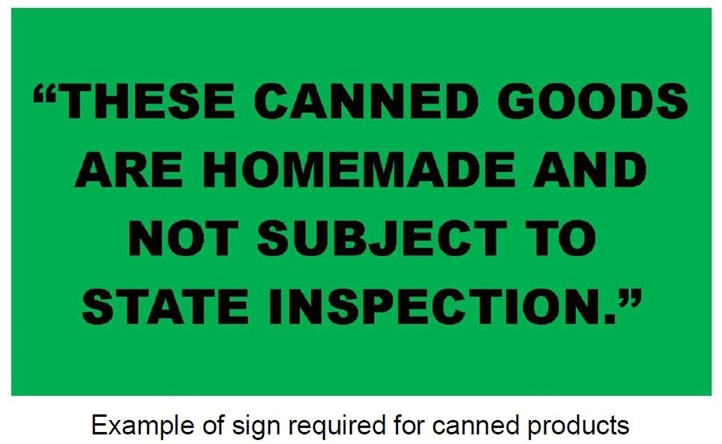
For more information on these signs, see the Labeling, Signage, and Packaging section above.

For more information on these signs, see the Labeling, Signage, and Packaging section above.
No. The Cottage Food Exemption is an exemption from food licensing and applies to food. Edible cannabinoids are explicitly excluded from the definition of food products found in Minn. Stats. §34A.01, subd. 4. Cannabinoids like THC or CBD cannot be ingredients in cottage food.
No. The Cottage Food Exemption is an exemption from food licensing and applies to food. Edible cannabinoids are explicitly excluded from the definition of food products found in Minn. Stats. §34A.01, subd. 4. Cannabinoids like THC or CBD cannot be ingredients in cottage food.
Neither a cottage food registration or food license are required to make and sell honey or maple syrup products if:
1) The person makes the products from hives they own or rent or trees that are on land they own or rent, and
2) No purchased or "off-land" ingredients are added to the products (e.g., adding cinnamon or honey/syrup/sap sourced from others).
The honey and maple syrup products would be considered a "product of the farm or garden" under Minnesota Statute and can be sold from the home, direct to consumers, at farmers' markets, shipped, and wholesaled to other businesses. Labeling requirements still apply. Please see Food Labeling Requirements for more information.
A cottage food registration or food license is required when purchased or ingredients are added to the honey or maple syrup product or if the producer is using sap, maple syrup, or honey from another producer. When this happens, the product is no longer considered a product of their farm or garden and is no longer excluded from licensing requirements.
Neither a cottage food registration or food license are required to make and sell honey or maple syrup products if:
1) The person makes the products from hives they own or rent or trees that are on land they own or rent, and
2) No purchased or "off-land" ingredients are added to the products (e.g., adding cinnamon or honey/syrup/sap sourced from others).
The honey and maple syrup products would be considered a "product of the farm or garden" under Minnesota Statute and can be sold from the home, direct to consumers, at farmers' markets, shipped, and wholesaled to other businesses. Labeling requirements still apply. Please see Food Labeling Requirements for more information.
A cottage food registration or food license is required when purchased or ingredients are added to the honey or maple syrup product or if the producer is using sap, maple syrup, or honey from another producer. When this happens, the product is no longer considered a product of their farm or garden and is no longer excluded from licensing requirements.
Yes. Minnesota Statute 28A.151 (Farmers' Market or Community Event; Food Product Sampling and Demonstration) allows food sampling and cooking demonstrations at farmers markets and community events without a license. However, all requirements in the law must be followed.
The food product sample must be:
- A small portion of no more than 3 ounces of a food or beverage that includes as a main ingredient a product sold by the vendor.
- Provided to customers at no cost.
- Ingredients and foods used in the samples and demonstrations are obtained from sources that comply with Minnesota food laws.
- Raw animal, raw poultry, and raw fish products must not be served as samples.
- Food product sampling or demonstrations including cooked animal, poultry, or fish products must be prepared onsite at the event.
- Animal or poultry products used must be from animals slaughtered under continuous inspection, either by the USDA or through Minnesota's Equal-To inspection program.
- Signage that lists the food sample’s ingredients and major allergens is posted.
- Food samples can be pre-packaged prior to the event. Those offering pre-packaged food samples that are completely sealed to prevent bare hand contact with the food are not required to have a handwashing station at the event. A handwashing station is required when handling open food for sampling or cooking demonstrations.
NOTE - The same food safety requirements as a Special Event Food Stand apply to sampling and cooking demonstrations. More details about requirements can be found on University of Minnesota Extension's website.
Yes. Minnesota Statute 28A.151 (Farmers' Market or Community Event; Food Product Sampling and Demonstration) allows food sampling and cooking demonstrations at farmers markets and community events without a license. However, all requirements in the law must be followed.
The food product sample must be:
- A small portion of no more than 3 ounces of a food or beverage that includes as a main ingredient a product sold by the vendor.
- Provided to customers at no cost.
- Ingredients and foods used in the samples and demonstrations are obtained from sources that comply with Minnesota food laws.
- Raw animal, raw poultry, and raw fish products must not be served as samples.
- Food product sampling or demonstrations including cooked animal, poultry, or fish products must be prepared onsite at the event.
- Animal or poultry products used must be from animals slaughtered under continuous inspection, either by the USDA or through Minnesota's Equal-To inspection program.
- Signage that lists the food sample’s ingredients and major allergens is posted.
- Food samples can be pre-packaged prior to the event. Those offering pre-packaged food samples that are completely sealed to prevent bare hand contact with the food are not required to have a handwashing station at the event. A handwashing station is required when handling open food for sampling or cooking demonstrations.
NOTE - The same food safety requirements as a Special Event Food Stand apply to sampling and cooking demonstrations. More details about requirements can be found on University of Minnesota Extension's website.
No. Chocolate-covered fruit is not allowed to be sold as a cottage food (e.g., berries, pineapple, melon).
No. Chocolate-covered fruit is not allowed to be sold as a cottage food (e.g., berries, pineapple, melon).

